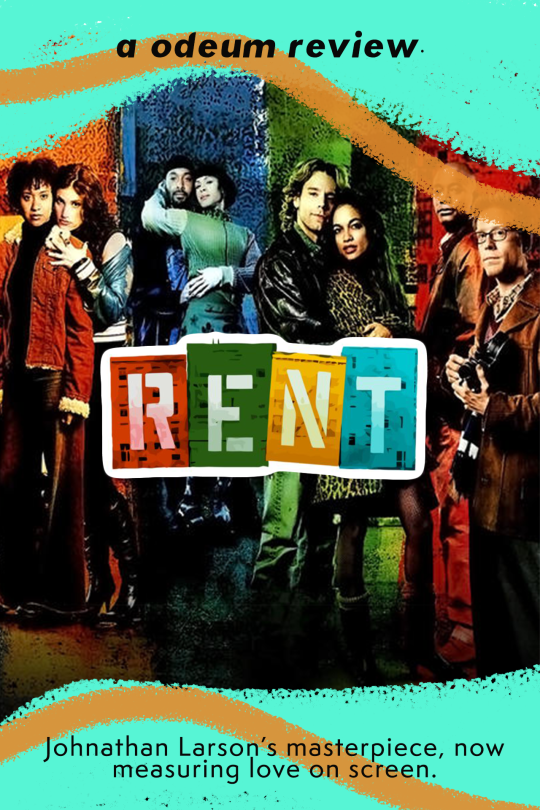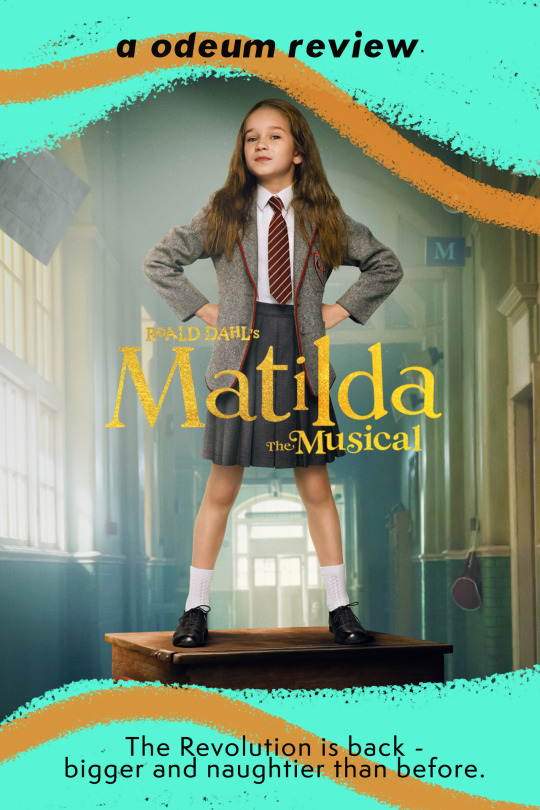Bringing Cinephiles and Thespians together since 2023.
Don't wanna be here? Send us removal request.
Text
Jonathan Larsons hit-musical RENT: Does it work on screen?

When talking about musical theatre, Jonathan Larson is one of the greatest writers and composers whose name is up there with Sondheim and Webber. And when speaking about musical stage to film adaptation, his most famous work “RENT” is at the top of this list. Yes, the musical was, and still is, a hit – but how does it perform on screen?
The musical drama film RENT (2006) based on Jonathan Larson’s original stage play and directed by Chris Columbus, follows a group of friends
in midst of the HIV crisis in New York. While all their friends are trying to find a new approach to love and life, all Roger wants is to write one more song in honour of his late girlfriend and Mark’s dream is to finally finish a documentary that will finally make him a filmmaker. What this group of friends and the individual couples experience is an ode to LGBTQIA+ culture in the 80’s, a piece for all the victims of HIV - as their journey takes them through highs and lows, in order to find appreciation for life and friendship.
Despite its stereotypical structure and story arch of a drama, the film adaptation of Johnathan Larsons musical masterpiece RENT feels like a new rollercoaster ride, every time you watch it.
Through a captivating score and detailed set design that takes us back to the 80s/90s, I felt
as though my attention was always with the film. But maybe that is just my love for that
time. Especially, Columbus’ detail to performance and the actor’s choreography kept me
hooked all the way through. Inspired by the original Broadway play and performed by some of its original stage cast, the effort to not lose its original charm and stagey feel was there. But did it work?
Tough question. As someone who has seen the stage play before, the film adaptation was a stripped-down version of the original story. Songs were cut and the storytelling slightly shifted to focus on Mark’s gaze rather than keep the individual stories of each character at length. Consequently, the life around Mark, built upon the struggles of his own mates, seems superficial and barely influential to his own life. Which leaves the question of motivation of the protagonist. To answer this, he’s hiding behind the camera – again and again and again. Despite being pictured as the protagonist and having most of the screen time, Mark’s life simply consists of seeing his friend’s stories through his lens in order to film his documentary. Makes sense, you would think. If only, Mark or one of his friends would have an obvious and in-depth storyline, but the connection of storylines is all over the place and jumps from character to character with little explanation. Now, this is not criticism on the story of RENT itself, but merely a negative note on the stripped-down film adaptation as we know how the story is originally organised.
It appears that the writers were trying to fill this gap of superficial storytelling by creating an even more dramatic atmosphere than in the original version. But even the star cast of the original Broadway version such as Idina Menzel as Maureen and Anthony Rapp as Mark could not fix or fill this missing gap. Important to mention, however, is the actors’ work in general. A wonderful and raw performance from each and every one of them. A star cast, that deserves its name and award nominations. If only, they could have given more through further developed characters.
Despite its previously mentioned captivating effect, the conversations between the characters were lacking any greater emotional interpretation – leaving the emotional journey of the characters up to their songs, choreographies, and sound scores. Combined with the focus on Mark, this leaves Columbus’ work as a superficial story that tries to tell a story through its pre-written songs rather than the storyline or cinematography itself. Agreed, the rock-inspired music is amazing and the way the original score influenced the film music is cleverly made and crafted. Unfortunately, music cannot simply carry a film alone. But in this case, it saved it. Without the songs and musical performances of the cast, I doubt this film would achieve this kind of emotional empathy and captivation throughout the entire story.
Personally, I think this is because RENT the film cannot stand on its own without the original stage adaptation, which is often the issue when adapting stage to screen or vice versa.
Despite its efforts to maintain the theatrical feeling, original empathy, and celebration of LGBTQIA+ culture – this film was, quite frankly, a little bit of a let-down. However, due to Jonathan Larson’s original characters, lyrics and score, there is a charm that I simply cannot shake off when I watch this film.
#rent#rent the musical#musical theatre#film review#film#film student#review#Jonathan Larson#chris columbus
2 notes
·
View notes
Text
Roald Dahl's Matilda The Musical: A Odeum Review.

Matilda has and will always be one of my comfort stories. Growing up with the film and being a huge fan of the musical, the news of this new Matilda musical into film adaptation was incredibly exhilarating for me.
So, what can one do other than immediately buy tickets and take yourself on a little self-care date?
For those of you who do not know about the little legend that is Matilda Wormwood, let me introduce you to her: Despite the neglect from her parents, Matilda, a young girl, grows up to teach herself all the knowledge and fun that life can offer. When the only school in town sends two of their teachers over to Matilda’s house, after hearing that a neglected six-year-old hasn’t been to school once, it is Matilda’s chance to receive the education she is so desperately craving. Ms Honey promises Matilda she would even learn how to write her own stories and takes her under her wing. If only, the incredibly smart Matilda wouldn’t be a thorn in the eye of cruel headmistress Ms Trunchbull. Soon, Matilda realises that the Trunchbull is not to be trusted and her own intelligence might expand to something she never thought would be possible. With her new-found powers and the help of her classmates, Matilda leads a revolution for justice.
Now, it's been a while since I left the cinema but I still can't decide whether I am happy and proud or quite frankly a little disappointed. Matthew Warchus, who also directed the original stage adaptation of Matilda on the West End and its Broadway transfer, certainly did a great job keeping its original appeal.
This new version of Matilda feels like it combines the original 1996 film with the musical in so many different aspects. A great success in that way! On the other hand, it felt as though the attempt to strive away from the stagey feel was going too far.
For instance, the 'When I Grow Up' Sequence wouldn't need to have the children driving motorbikes and flying planes, in order to maintain its emotional value. If anything, it achieved the contrary. In my opinion, at last. 'Quiet' is another great example. However, in this case it rather felt like they were trying to oppose reality. But once again, very over the top and along with that the greenscreen and animation was very clear to see and took that illusion of dreamy reality.
They certainly tried to establish a feeling of reality and turn it into a rather immersive experience for the audience through playing with diagetic sound during the musical numbers. A great way to keep people engaged, in some moments, however, once again over the top. Hearing individual voices within the ensembles louder than others whenever the camera got closer is a great idea, but in this case felt unsuccessfully executed and rather felt like a poorly mixed song. Additionally, some of the songs were sped up which felt as though they were in a hurry to tell the story.
Despite all of these negative notes on the songs, I do have to add that it was generally astounding. Mixing the themes into the score worked incredibly well, added the needed suspense and underlined the emotional storytelling through music.
But by no means do these negative notes affect the quality of storytelling in this film in any way. Warchus did a great job at bringing Matilda's story to screen, once again.
The partly original choreographies - mainly performed by the children - absolutely blew my mind and the talent that was shown on screen sometimes made me rethink my own success and talent in life.
For a film that heavily relies on children’s actors, this one was incredibly well cast with astounding actors and mind-blowing triple-threads. Leading this wonderful army of young performers is Alisha Weir as Matilda.
This new production also gives us a chance to engage more with side characters such as Nigel, Lavender, and Bruce. Through distinguishing them more from the rest of the class, their characters blossom and their bond to our protagonist Matilda becomes clearer - more screentime for successful character development. To mention is also the relationship between Miss Honey (Lashana Lynch) and Matilda herself - I can’t quite put my finger on what it is that made this friendship in this film so raw and real. A beautifully crafted relationship between them that simply works and warms hearts in contrast to Emma Thompson’s Miss Trunchbull, who appears even crueller and colder than in any production of Matilda before. A great way to establish greater emotional gaps between characters and story strings and astounding work by Emma Thompson herself.
One of the biggest positives, however, is the representation in this film. Sure, Matilda herself remains the smart white girl she has also been in Roald Dahl’s original books - but casting PoC for most of the characters, such as Lashana Lynch as Miss Honey and Sindhu Vee as Mrs. Phelps but also many of the Ensemble kids and adults, made me indescribably happy. Especially, seeing the reaction of kids in the audience who are people of colour themselves, warmed my heart but at the same time shows that we need more and more of this. This new version of Matilda is definitely taking the right steps.
All in all, a brilliant execution that ties two past productions together, but would have benefited from the advice of 'less is more'.
A great watch for all ages - Matilda will forever remain a timeless classic.
#alisha weir#lashana lynch#Matilda#matilda 2022#roald dahl#Matilda the musical#matilda wormwood#film review#musical#musical theatre#film student#matilda netflix#miss honey#miss trunchbull#emma thompson
5 notes
·
View notes
Text
WELCOME TO ODEUM.
Anchored in the Latin language, “odeum” (/ˈəʊdɪəm/) describes a small, roofed building which was primarily used for musical performances in the ancient Greece and Rome. Decades later, we mainly associate the word with its Greek translation “odeon” (/ˈəʊdɪən/) – the name of one of the biggest cinema chains in Europe. This crossover of ancient and modern correlation is what Odeum builds upon. This blog prides itself in merging stage and screen and therefore lays its focus on stage-to-screen adaptations or vice versa. A place where cinephiles and thespians come together to cherry pick the gems of stage or screen adaptations.
Now dive into a world of stage and screen and don't be afraid to put your own ideas forward! We can't wait to share our work and connect with you.
#filmreview#film#theatre#musical theatre#stageplay#filmadaptation#screenadaptation#stage adaptation#cinephile#thespian#film blog#review#film student
3 notes
·
View notes